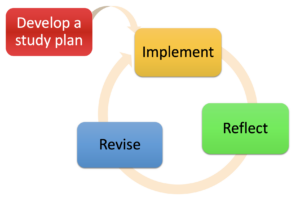At this point in the semester you’ve probably gotten at least one prelim or graded essay back, and you might be wondering, “what should I do with it?”. Whether the score you earned makes you want to jump for joy or curl up into a ball, learning from your graded work is an incredibly valuable opportunity.
Do not, repeat DO NOT, immediately toss or file away the test or essay you just got back! Instead, think about two things: the content (what did you get correct and what did you lose points on?) and your study plan (what strategies did you use and when did you study?).
Reflect on content
 When you think about content, ask yourself honestly: “Why did I lose points here?” and “What is the correct answer, and why?”. Sometimes you misread a questions, other times you have no idea why you lost points, occasionally you might have known the answer, but it didn’t make it to the paper, or perhaps you think there was a grading error. So what do you do? Check out the LSC page on what to do when you get your graded prelims back for some ideas!
When you think about content, ask yourself honestly: “Why did I lose points here?” and “What is the correct answer, and why?”. Sometimes you misread a questions, other times you have no idea why you lost points, occasionally you might have known the answer, but it didn’t make it to the paper, or perhaps you think there was a grading error. So what do you do? Check out the LSC page on what to do when you get your graded prelims back for some ideas!
Reflect on your study plan
 Even before you get your prelim back, take a few minutes to think about what you did, or didn’t do, to prepare. Did you develop a study plan? How happy were you with your plan? What study strategies did you use? What worked? What didn’t? What will you do differently to prepare for the next prelim? Sometimes tweaking what you do to prepare for a prelim, including study strategies and planning in study time earlier, can help your prelim performance.
Even before you get your prelim back, take a few minutes to think about what you did, or didn’t do, to prepare. Did you develop a study plan? How happy were you with your plan? What study strategies did you use? What worked? What didn’t? What will you do differently to prepare for the next prelim? Sometimes tweaking what you do to prepare for a prelim, including study strategies and planning in study time earlier, can help your prelim performance.
Successful students ask for help when they need it!
Remember, whether you are preparing for your next prelim or working through what you didn’t get correct on a past prelim, successful students reach out for help when they need it!

